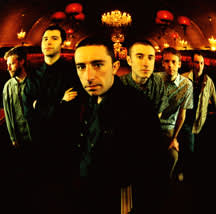"The reason for picking the name was just strictly functional, to try to describe how the music sounds," explains Cinematic Orchestra conductor J. Swinscoe. "Obviously it doesn't relate in any way to jazz, but to textures and atmospheres and the way film music is constructed with the ideas of narrative and tension."
Nevertheless, Swinscoe's crew which includes team of crack jazz musicians who improvise over his symphonic beats and samples had never actual done any film work until 2000's Porto Film Festival in Portugal. Fresh from performing at a lifetime achievement tribute to Stanley Kubrick, the troupe was commissioned to write a new soundtrack for the classic 1920s Soviet flick The Man With The Movie Camera to be presented live.
"It was the first time I'd taken on a proper score, as it were. We were in this old theatre with a full house and we were sunk down in an orchestra pit and the film was projected above us. It was done in an old-school way, the way cinemas used to have the guy on the piano at the side playing honky-tonk," he says. "But we were using samplers, percussion, turntables and effects units and also a jazz rhythm section. It's quite an arty thing to get involved in and I quite like that aspect of it. Rather than writing albums for years and years, I'd rather deal with the visual as well. It's just a bit more challenging."
This assignment came just as they were preparing a follow-up to their genre-defying 1999 debut Motion. Two tracks composed for the film made it on to their latest full-length Everyday, and Swinscoe who likens his role in the group to that of a film director says most of the album also grew out of that experience.
While his influences range from Taxi Driver/Citizen Kane composer Bernard Herrmann to Quincy Jones and Miles Davis (who produced one of his best efforts for the Louis Malle picture Ascenseur Pour L'echafaud) Swinscoe himself has had little luck getting film work.
He was asked to submit a sample to Toronto-based indie filmmaker Bruce McDonald for his Juliette Lewis flick Claire's Hat, but his efforts were rejected. And while he's in talks with a London-based indie film company, nothing has yet come of it. "[Our name] makes people within the film industry check us out and we get asked to do film festivals and people can say the music is very film-based and I think it is, to an extent but then why aren't more people using it for films? It's quite ironic."
Nevertheless, Swinscoe's crew which includes team of crack jazz musicians who improvise over his symphonic beats and samples had never actual done any film work until 2000's Porto Film Festival in Portugal. Fresh from performing at a lifetime achievement tribute to Stanley Kubrick, the troupe was commissioned to write a new soundtrack for the classic 1920s Soviet flick The Man With The Movie Camera to be presented live.
"It was the first time I'd taken on a proper score, as it were. We were in this old theatre with a full house and we were sunk down in an orchestra pit and the film was projected above us. It was done in an old-school way, the way cinemas used to have the guy on the piano at the side playing honky-tonk," he says. "But we were using samplers, percussion, turntables and effects units and also a jazz rhythm section. It's quite an arty thing to get involved in and I quite like that aspect of it. Rather than writing albums for years and years, I'd rather deal with the visual as well. It's just a bit more challenging."
This assignment came just as they were preparing a follow-up to their genre-defying 1999 debut Motion. Two tracks composed for the film made it on to their latest full-length Everyday, and Swinscoe who likens his role in the group to that of a film director says most of the album also grew out of that experience.
While his influences range from Taxi Driver/Citizen Kane composer Bernard Herrmann to Quincy Jones and Miles Davis (who produced one of his best efforts for the Louis Malle picture Ascenseur Pour L'echafaud) Swinscoe himself has had little luck getting film work.
He was asked to submit a sample to Toronto-based indie filmmaker Bruce McDonald for his Juliette Lewis flick Claire's Hat, but his efforts were rejected. And while he's in talks with a London-based indie film company, nothing has yet come of it. "[Our name] makes people within the film industry check us out and we get asked to do film festivals and people can say the music is very film-based and I think it is, to an extent but then why aren't more people using it for films? It's quite ironic."
